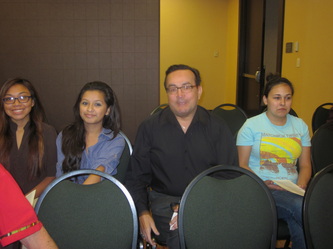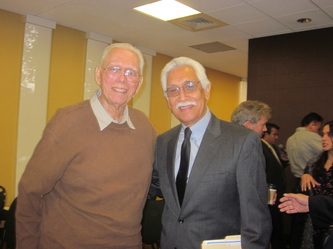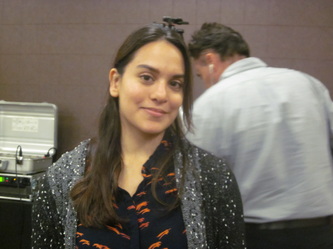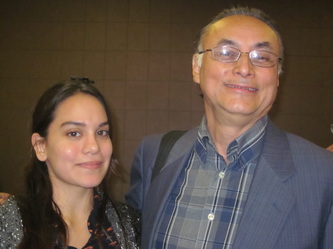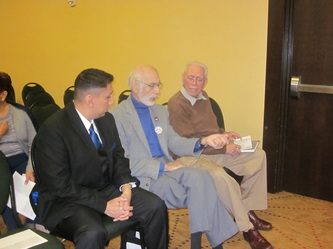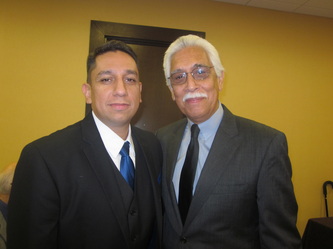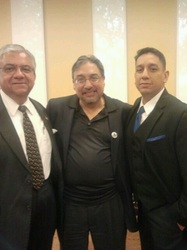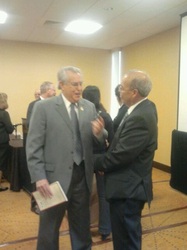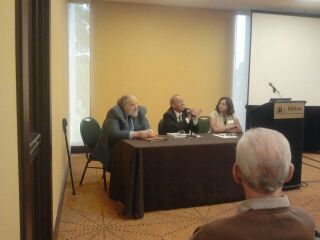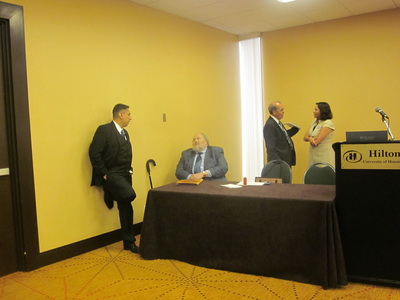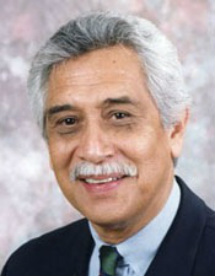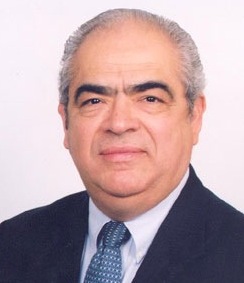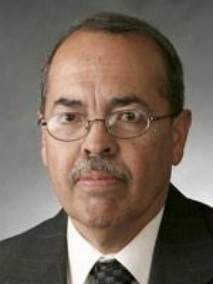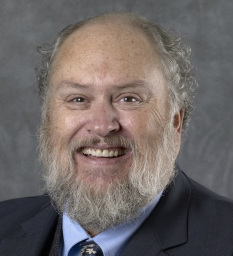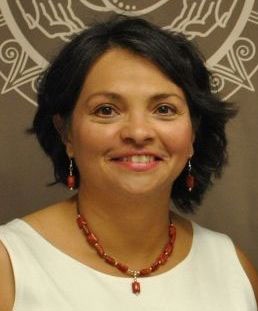Dr. Tatcho Mindiola, Jr. (Symposium Co-Chair)
Dr. Tatcho Mindiola is the Director of the Center for Mexican American Studies and Associate Professor of Sociology at the University of Houston. Professor Mindiola has a bachelor’s degree in Business Administration and a Master’s degree in Sociology from the University of Houston. He earned his Ph.D. in Sociology from Brown University.
Professor Mindiola’s research, publications, and teaching areas are in race relations, political sociology, and demography with particular emphasis on Mexican Americans. His current research deals with the relationship between Mexican and African Americans, the educational experiences of Mexican Americans in the public school system, and the portrayal of Mexican Americans in film. Professor Mindiola is also a political analyst for Channel 13 television and has written a number of editorials for VIVA Magazine and theHouston Chronicle.
Dr. Tatcho Mindiola is the Director of the Center for Mexican American Studies and Associate Professor of Sociology at the University of Houston. Professor Mindiola has a bachelor’s degree in Business Administration and a Master’s degree in Sociology from the University of Houston. He earned his Ph.D. in Sociology from Brown University.
Professor Mindiola’s research, publications, and teaching areas are in race relations, political sociology, and demography with particular emphasis on Mexican Americans. His current research deals with the relationship between Mexican and African Americans, the educational experiences of Mexican Americans in the public school system, and the portrayal of Mexican Americans in film. Professor Mindiola is also a political analyst for Channel 13 television and has written a number of editorials for VIVA Magazine and theHouston Chronicle.
Hon. Lupe Salinas (Symposium Co-Chair)
The Honorable Lupe S. Salinas (Ret.) Professor of Law served as a Texas state court judge for 16 years before becoming a tenured law professor at The Thurgood Marshall School of Law in Houston, Texas. In addition, Professor Salinas served as an Assistant United States Attorney and as a Special Assistant to the United States Attorney General as well as a staff attorney with the Mexican-American Legal Defense and Education Fund at earlier points in his career. A prolific author, he has written numerous articles concerning Hispanics and the law, including educational disparities encountered by Hispanic students in our nation's educational system. He currently serves as Chair of the HNBA Civil Rights Section, a position to which he has been appointed by three HNBA National Presidents. In 2010, the Government of Mexico awarded him with its prestigious "Othli Award" for his many contributions to Mexican nationals living in the United States. This is the highest award bestowed by the Mexican government to a foreigner.
The Honorable Lupe S. Salinas (Ret.) Professor of Law served as a Texas state court judge for 16 years before becoming a tenured law professor at The Thurgood Marshall School of Law in Houston, Texas. In addition, Professor Salinas served as an Assistant United States Attorney and as a Special Assistant to the United States Attorney General as well as a staff attorney with the Mexican-American Legal Defense and Education Fund at earlier points in his career. A prolific author, he has written numerous articles concerning Hispanics and the law, including educational disparities encountered by Hispanic students in our nation's educational system. He currently serves as Chair of the HNBA Civil Rights Section, a position to which he has been appointed by three HNBA National Presidents. In 2010, the Government of Mexico awarded him with its prestigious "Othli Award" for his many contributions to Mexican nationals living in the United States. This is the highest award bestowed by the Mexican government to a foreigner.
Dr. Ignacio M. Garcia (Speaker)
Ignacio M. Garcia is the Lemuel H. Redd Jr. professor of Western American History at Brigham Young University (BYU). He has written five books related to Mexican-American politics and history.
Garcia was born in Nuevo Laredo, Tamaulipas, Mexico and came to the United States in the mid-fifties. He served as a combat medic in the 477th medical detachment in the U.S. Army and did a tour in Viet Nam, 1971–1972, where he headed the emergency room of the Can Tho Army Airbase dispensary. He received his bachelors degree from Texas A&I University (now Texas A&M University–Kingsville) in 1976. He received masters and Ph.D.s from the University of Arizona. While he was a student at the University of Arizona Garcia was serving as bishop of the Spanish-speaking LDS ward in Tucson. He also served as bishop in Corpus Christi, Texas in 1995.
While working on his masters and Ph.D. Garcia taught classes at both the University of Arizona and Pima Community College. From 1993-1995 Garcia was a professor at Texas A&M University–Corpus Christi. Since 1995 he has been a professor at BYU. While at BYU Garcia has served on the executive board of the Rey L. Pratt Center for Latin American Studies and the Admissions Committee. He has also served in the Utah Humanities Council, the Tucson Energy Commission and the Utah Judicial Commission for the Fourth District Court.
Prior to entering academia Garcia worked as a news correspondent and editor. He was the regional editor for Nuestro magazine from 1979-1983. Prior to this he was a sports writer for the Laredo News and a reporter for the San Antonio Express's Westside weekly.
Garcia has written several books including Viva Kennedy: Mexican Americans in Search of Camelot[1] and Chicanismo. His United We Win: The Rise and Fall of La Raza Unida Party has been widely reviewed.[2] This was the first comprehensive history of the party written.[3]
He has also written "Viva Kennedy, Mexican Americans in Search of Camelot", "Hector P. Garcia:In Relentless Pursuit of Justice", and his most current book is "White But Not Equal" which tells the story of the Supreme Court case Hernandez vs Texas which deals with jury discrimination against Mexican Americans. He is currently working on a sports history.
Ignacio M. Garcia is the Lemuel H. Redd Jr. professor of Western American History at Brigham Young University (BYU). He has written five books related to Mexican-American politics and history.
Garcia was born in Nuevo Laredo, Tamaulipas, Mexico and came to the United States in the mid-fifties. He served as a combat medic in the 477th medical detachment in the U.S. Army and did a tour in Viet Nam, 1971–1972, where he headed the emergency room of the Can Tho Army Airbase dispensary. He received his bachelors degree from Texas A&I University (now Texas A&M University–Kingsville) in 1976. He received masters and Ph.D.s from the University of Arizona. While he was a student at the University of Arizona Garcia was serving as bishop of the Spanish-speaking LDS ward in Tucson. He also served as bishop in Corpus Christi, Texas in 1995.
While working on his masters and Ph.D. Garcia taught classes at both the University of Arizona and Pima Community College. From 1993-1995 Garcia was a professor at Texas A&M University–Corpus Christi. Since 1995 he has been a professor at BYU. While at BYU Garcia has served on the executive board of the Rey L. Pratt Center for Latin American Studies and the Admissions Committee. He has also served in the Utah Humanities Council, the Tucson Energy Commission and the Utah Judicial Commission for the Fourth District Court.
Prior to entering academia Garcia worked as a news correspondent and editor. He was the regional editor for Nuestro magazine from 1979-1983. Prior to this he was a sports writer for the Laredo News and a reporter for the San Antonio Express's Westside weekly.
Garcia has written several books including Viva Kennedy: Mexican Americans in Search of Camelot[1] and Chicanismo. His United We Win: The Rise and Fall of La Raza Unida Party has been widely reviewed.[2] This was the first comprehensive history of the party written.[3]
He has also written "Viva Kennedy, Mexican Americans in Search of Camelot", "Hector P. Garcia:In Relentless Pursuit of Justice", and his most current book is "White But Not Equal" which tells the story of the Supreme Court case Hernandez vs Texas which deals with jury discrimination against Mexican Americans. He is currently working on a sports history.
Michael A. Olivas, Ph.D., J.D. (Speaker)
Distinguished Chair in Law, University of Houston Law Center
Michael A. Olivas is the William B. Bates Distinguished Chair in Law at the University of Houston Law Center and Director of the Institute for Higher Education Law and Governance at UH. He is the author of the state statutes on undocumented students for six states, and the new book No Undocumented Child Left Behind: Plyler v. Doe and the Education of Undocumented Schoolchildren (NY: NYU Press, 2012, and many other books.
In 2001, he was selected for the Esther Farfel Award, as the Outstanding Professor at the University of Houston. He has been elected to membership in the American Law Institute and the National Academy of Education, the only person to have been selected to both honor academies. Both the Mexican American Legal Defense and Educational Fund (MALDEF) and The Hispanic Bar Association of Houston have given him awards for lifetime achievement. He holds a B.A. (Magna Cum Laude) from the Pontifical College Josephinum, an M.A. and Ph.D. from the Ohio State University, and a J.D. from Georgetown University Law Center
Distinguished Chair in Law, University of Houston Law Center
Michael A. Olivas is the William B. Bates Distinguished Chair in Law at the University of Houston Law Center and Director of the Institute for Higher Education Law and Governance at UH. He is the author of the state statutes on undocumented students for six states, and the new book No Undocumented Child Left Behind: Plyler v. Doe and the Education of Undocumented Schoolchildren (NY: NYU Press, 2012, and many other books.
In 2001, he was selected for the Esther Farfel Award, as the Outstanding Professor at the University of Houston. He has been elected to membership in the American Law Institute and the National Academy of Education, the only person to have been selected to both honor academies. Both the Mexican American Legal Defense and Educational Fund (MALDEF) and The Hispanic Bar Association of Houston have given him awards for lifetime achievement. He holds a B.A. (Magna Cum Laude) from the Pontifical College Josephinum, an M.A. and Ph.D. from the Ohio State University, and a J.D. from Georgetown University Law Center
Dr. Cynthia Orozco (Speaker)
Dr. Cynthia E. Orozco obtained her BA from the University of Texas at Austin and an MA and PhD from UCLA. She taught at the University of Texas at San Antonio and University of New Mexico. She is the co-editor of Mexican Americans in Texas History, an associate editor of Latinas in the United States: An Historical Encyclopedia and served as Research Associate at the Texas State Historical Association where she wrote 80 articles on Texas history for the New Handbook of Texas. She has also worked as Research Associate at the Institute of Texan Cultures. Orozco received two Ford Foundation grants to complete her book research. She currently teaches World Humanities, Western Civilization and Lincoln County history at ENMU-Ruidoso, New Mexico and was appointed to the New Mexico Humanities Council by Governor Richardson. The Texas State Historical Association named Orozco a fellow in 2012
Dr. Cynthia E. Orozco obtained her BA from the University of Texas at Austin and an MA and PhD from UCLA. She taught at the University of Texas at San Antonio and University of New Mexico. She is the co-editor of Mexican Americans in Texas History, an associate editor of Latinas in the United States: An Historical Encyclopedia and served as Research Associate at the Texas State Historical Association where she wrote 80 articles on Texas history for the New Handbook of Texas. She has also worked as Research Associate at the Institute of Texan Cultures. Orozco received two Ford Foundation grants to complete her book research. She currently teaches World Humanities, Western Civilization and Lincoln County history at ENMU-Ruidoso, New Mexico and was appointed to the New Mexico Humanities Council by Governor Richardson. The Texas State Historical Association named Orozco a fellow in 2012
